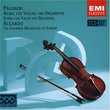| All Artists: Brahms, Tomowa-Sintow, Van Dam, Karajan Title: German Requiem Members Wishing: 0 Total Copies: 0 Label: Angel Records Release Date: 10/25/1990 Genre: Classical Styles: Opera & Classical Vocal, Historical Periods, Early Music, Modern, 20th, & 21st Century Number of Discs: 1 SwapaCD Credits: 1 UPC: 077776922928 |
Search - Brahms, Tomowa-Sintow, Van Dam :: German Requiem
 | Brahms, Tomowa-Sintow, Van Dam German Requiem Genre: Classical
Although he tried several times, Herbert von Karajan never surpassed his 1947 account of Eine Deutsches Requiem with the Vienna Philharmonic, a reading of fervent, post-war intensity. The closest he came in the stereo era ... more » |
Larger Image |
CD DetailsSynopsis
Amazon.com Although he tried several times, Herbert von Karajan never surpassed his 1947 account of Eine Deutsches Requiem with the Vienna Philharmonic, a reading of fervent, post-war intensity. The closest he came in the stereo era was his 1976 remake with the Berlin Philharmonic and the Vienna Singverein, which remained his favorite chorus over the years. The account is interpretively consistent with Karajan's view of the symphonies and with the earlier reading of the Requiem--a polished, firmly sculpted, dramatic rendition that as usual with Karajan, and in spite of the fact that the tempos are on the slow side, has real grip. José Van Dam delivers impassioned accounts of his solos, and Anna Tomowa-Sintow is radiant in "Ihr habt nun Traurigkeit." The sound is excellent--not always a guarantee with EMI in the 1970s. --Ted Libbey Similar CDs
|
CD ReviewsAn essential Karajan performance Santa Fe Listener | Santa Fe, NM USA | 10/05/2005 (5 out of 5 stars) "I agree with everything said in the Amazon review. Karajan's 1947 German Requiem is a sonic miracle, really--despite its age and the wretched conditions in Vienna two years after the war, one hears everything in the chorus, the orchestral sound has weight annd impact, and the soloists are unsurpassed. That reading was a fervent document from survivors of mass catastrophe, a moving assurance that music would outlive polotics and suffering. This is Karajan's first stereo Requiem, I believe, and it updates the older reading with almost equally good soloists. Karajan is not slick or glib here, and I find his polished approach (which became too polished on his later German Requiem for DG) as valid as Kelmperer's on his classic 1961 recording, also for EMI (that set suffers from microphone overload at climaxes, which may or may not be significant to listerners today.) But as the Amazon reviewer says, even this excellent reading cannot duplicate the spiritual fervor and deep emotionality of Karajan's first post-war recording. I treasure both in their own ways." Karajan's 1976 German Requiem is a sonic spectacular pyramidcvv | Western US | 11/17/2007 (5 out of 5 stars) "Herbert von Karajan has released several recordings of the Brahms German Requiem. This one was recorded in 1976 with the Berlin Philharmonic and the Wiener Singverein, the same forces used in his 1965 recording.
The Wiener Singverein produces gorgeous legato lines as well as full-bodied, powerful climaxes. They have fine diction, but occasionally they are under-pitched. Overall, they do memorable work in this recording. Anna Tomowa-Sintow is one of my favorite soloists for this piece. She brings out all the deep emotions contained in this score and produces a sound of exceptional beauty. Jose van Dam likes to use long legato lines in everything he does in this recording. He has a fine voice, but I felt there could have been a bit more drama. George London and Hans Hotter (in Karajan's 1947 disc) came closer to what I was looking for. The recorded sound is very impressive. Movements #2 and #6 come off with unbelivable power that carries you along all the way to their monumental climaxes. While the orchestra and chorus are well-miked, Jose van Dam sounded a bit under-miked in Movement 3. Texts and translations included." |

 Track Listings (7) - Disc #1
Track Listings (7) - Disc #1



